The National Kidney Foundation’s Health Equity Advisory Committee will be comprised of a multidisciplinary group of healthcare professionals, advocates, and leaders who have expertise and/or vested interest in identifying health care injustice in kidney health and creating solutions for inequitable healthcare delivery.
This leadership group will be responsible for directing and championing NKF’s health equity, community health, and social justice efforts through research, education and partnerships. The Advisory Committee will work collaboratively with patients, other NKF committees, boards, and NKF staff to ensure that all people living with, or at risk for, kidney disease have access to health resources and support with the overarching goal of addressing health equity.
Purpose:
- To advise in the design, implementation and evaluation of programs, activities, and resources that will support stronger and healthier communities.
- To provide council in support of achieving NKF’s overarching health equity goal.
Beatrice Concepcion, MD — Co-chair
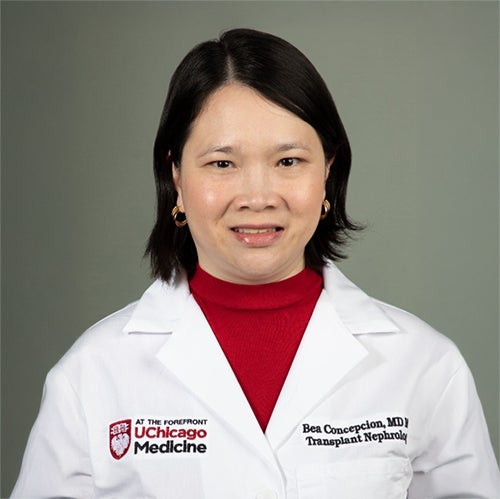
Beatrice P. Concepcion, MD is a transplant nephrologist and Associate Professor of Medicine at the University of Chicago in the Section of Nephrology. She serves as the medical director of the kidney and pancreas transplant program and Practice Chair of the Transplant Institute.
Dr. Concepcion received her medical school degree in 2004 from the University of the Philippines in Manila. She pursued further training in Internal Medicine and Nephrology at Rush University Medical Center in Chicago, IL and completed a fellowship in Transplant Nephrology at Vanderbilt University Medical Center in Nashville, TN in 2011. Prior to joining the University of Chicago in 2023, she was a faculty member at Vanderbilt for 10 years.
As medical director of the transplant program, she actively works with the multi-disciplinary team to maintain excellent patient outcomes and patient satisfaction, and to foster growth and innovation. Dr. Concepcion is a busy clinician caring for kidney transplant recipients and evaluating recipient and living donor candidates. In addition to her administrative and clinical responsibilities, she is actively involved in the education of transplant nephrology and general nephrology fellows and medical residents. Her research interests include increasing access to kidney and pancreas transplantation and improving clinical and patient-centered outcomes of kidney transplant recipients.
Dr. Concepcion has served on several important national committees and workgroups including the United Network for Organ Sharing/Organ Procurement and Transplantation Network Kidney Committee from 2020-2023. Currently, she is a member of the American Society of Nephrology/American Society of Transplantation Taskforce created to pursue ACGME accreditation for transplant nephrology as a specialty. She is also the co-chair of the National Kidney Foundation’s Health Equity Advisory Committee and a member of the American Society of Nephrology's Public Policy and Advocacy Committee. She is a Fellow of the American Society of Nephrology and a Fellow of the American Society of Transplantation.
Sylvia E. Rosas, MD, MSCE — Co-chair
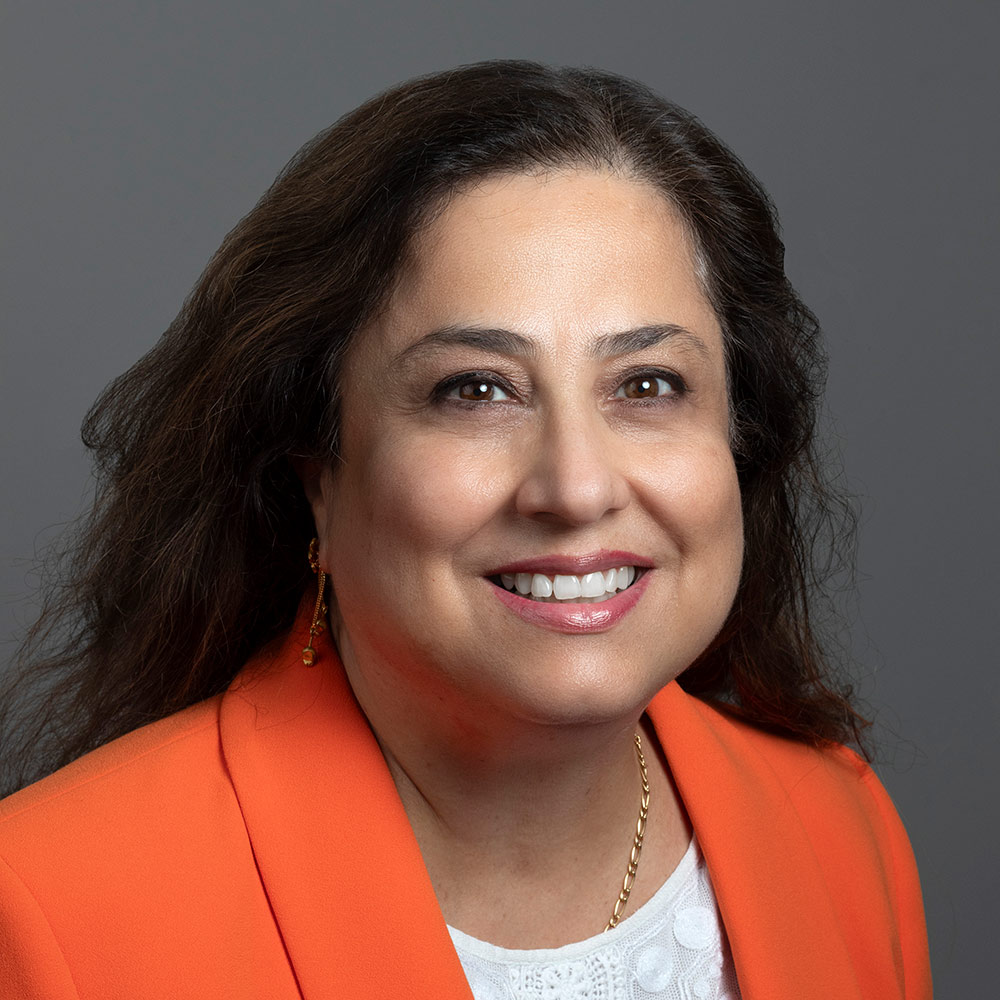
Dr. Rosas is a nephrologist and physician-scientist at the Joslin Diabetes Center in Boston, MA, and the Immediate Past President of the National Kidney Foundation. She is the Director of the Latino Kidney Clinic and an Associate Professor of Medicine at Harvard Medical School and the Beth Israel Deaconess Medical Center. Her primary research focus is on the epidemiology of metabolic and cardiovascular disease complications in patients with chronic kidney disease particularly diabetic kidney disease.
Dr. Rosas is the clinical center PI in the NIDDK-funded multicenter APOL1 Long-term Kidney Transplantation Outcomes Network (APOLLO) that evaluates the role of the APOL1 gene in kidney transplant outcomes. She is also the PI for the Kidney Precision Medicine Program (KPMP) Chronic Kidney Disease recruitment site at Joslin Diabetes Center. KPMP aims to ethically obtain and evaluate human kidney biopsies in order to create a kidney tissue atlas, define disease subgroups, and identify critical cells, pathways, and targets for novel therapies. She has received numerous awards including the National Kidney Foundation (NKF) of New England Physician of the Year in 2017 and National Hispanic Medical Association Fellow of the Year Award. She has been a longtime volunteer with the NKF including been a member of the Spring Clinical meeting planning committee, a judge at the Young Investigator Forum and a member of the Scientific Advisory Board at the National Kidney Foundation. On a local level, she has been a member of the medical board of the NKF NE chapter. She is a member of the Editorial Board of the American Journal of Kidney Diseases, Clinical Journal of the American Society of Nephrology and the Advances in Kidney Health and Disease Journal. Dr. Rosas served as the Chair of the Minority Affairs Committee of the Organ Procurement and Transplant Network/United Network for Organ Sharing and secretary for Women in Nephrology.
Dr. Allyson Brotherson
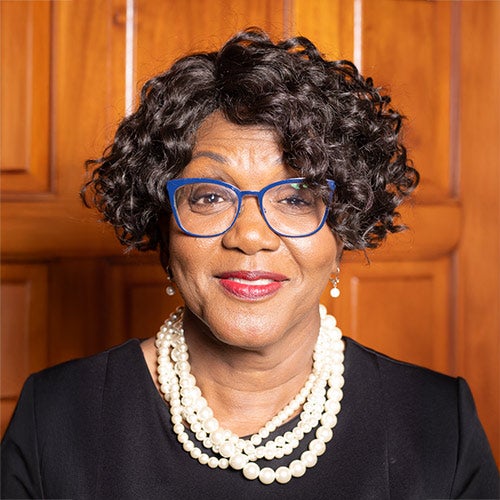
Allyson Brotherson is a physician leader who is currently Chair of the Department of Family Medicine at Hennepin HealthCare in Minnesota. In her current role she is responsible for the development and implementation of the vision for the Department of Family Medicine and drives strategic growth of operational and financial performance for Inpatient and Outpatient Family Medicine.
Dr. Brotherson has been at Hennepin health care for 23 years and in her previous role as Senior Medical Director of the Primary Care ring from 2017-2023, she had oversight of clinical strategies continuous process improvement, patient experience, provider engagement and health outcomes across an integrated system of 6 community clinics. She served as Residency Program Director of the Family Medicine Residency from 2005-2017, where she supervised a comprehensive residency training curriculum, ensured compliance with accreditation requirements and cultivated an environment that supported learning and development.
Her primary research areas of interest have been in medical education, and she has presented at National Family Medicine forums on curriculum development for care of patients with complex care needs, competency-based education, and health equity leadership.
She lives by personal conviction, values and beliefs assuring that she can face tough situations with poise and assurance. As a leader, she serves with humility and empathy. As a physician, she provides high quality, equitable and compassionate care to her patients and the communities where she serves. Her greatest reward has been in her role as teacher. Whether it was teaching high school, graduate or medical students, family medicine residents or patients, she lives for the satisfaction of seeing the beginning of understanding of a difficult concept or diagnosis in a learner’s or patient’s eyes and the confidence that the mastery of new knowledge brings.
Dr. Brotherson has been recognized for her leadership in residency education, achieving the Association of Family Medicine Residency Directors (AFMRD) Program Director’s Silver Recognition award. She has received teaching awards for her teaching of residents and has been named Top Doctor by Minnesota Monthly Magazine in 2015, 2024 and 2025.
She received a Bachelor of Science degree in Chemistry and Zoology from the University of the West Indies, a Master’s degree in Molecular Biology from Howard University and her MD degree from the University of Maryland at Baltimore.
In her free time, she enjoys reading, listening to music especially from her native country of Trinidad and Tobago and spending time with family.
Claudia Camacho
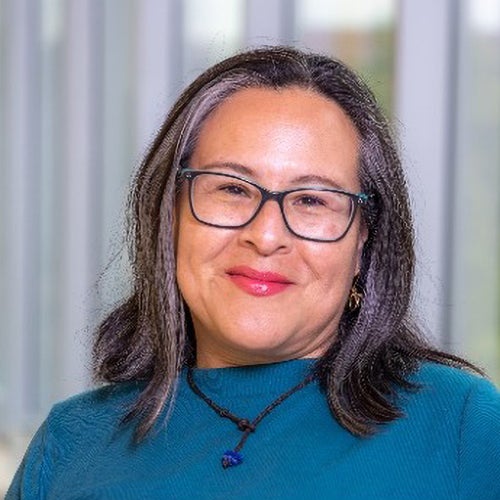
Claudia Camacho is a bilingual Latina with over two combined decades of dedicated service at CU Anschutz and Denver Health Medical Center, safety net city hospital where she worked as a Spanish medical interpreter and healthcare professional. She holds a BA in Anthropology from Metropolitan State University, which has enriched her understanding of diverse cultural perspectives. Her personal journey with kidney disease, inspired by her father’s battle and subsequent passing due to kidney disease, fuels her passion for improving patient care in kidney health. This experience has driven her to excel in research, where she has conducted one-on-one qualitative interviews and led a 120-participant randomized intervention study across urban dialysis centers.
She actively shares her experiences and advocates for the Latino community at various conferences and workshops. Her current position is allowing her to mentor the next group of all Latina community health workers in all the required training, and practice to success in the NAVIGATE-kd intervention study.
As a leader, Ms. Camacho also spearheads a Spanish speakers-only community steering committee. This group, composed of patients, community leaders, and university scholars, is dedicated to designing culturally concordant interventions for chronic kidney (CKD) disease individuals.
Dr. Janet Diaz Martinez

Dr. Janet Diaz Martinez is an Assistant Professor at Florida International University in the Department of Dietetics & Nutrition and a Registered Clinical Dietitian with extensive experience working with patients living with chronic conditions such as diabetes, hypertension, and chronic kidney disease (CKD). She also leads community-based nutrition programs. Currently, Dr. Diaz Martinez teaches Nutrition Science and Implications for Community Health course, as well as a Graduate Seminar course.
Dr. Diaz Martinez has served as Principal Investigator (PI) on multiple funded grants including the National Kidney Foundation and the Patient-Centered Outcomes Research Institute (PCORI). She is an affiliated faculty member with the NIH-funded FIU-RCMI Community Engagement Core. Her research focuses on kidney disease and associated modifiable risk factors in underserved Latino populations, with an emphasis on developing culturally adapted, evidence-based interventions to improve kidney health-related outcomes. These interventions target key therapeutic areas such as glycemia, blood pressure, albuminuria, and lipid control, ultimately aiming to delay the progression of CKD.
Dr. Diaz Martinez has led the co-development of CKD patient education materials tailored to Latino communities with low health literacy and limited English proficiency in under-resourced areas. She has partnered with Community Health Workers (CHWs) to design and deliver culturally relevant education interventions at the community level to improve the health and well-being of Latino patients. Additionally, through a community-engaged research methodology, Dr. Diaz Martinez is developing a patient-driven research agenda, supported by key stakeholders, to guide the design and implementation of patient-centered medical and nutrition interventions that empower patients living with CKD to make informed decisions, improving both healthcare delivery and clinical outcomes that are clinically relevant and meaningful to patients.
Brittany Dickerson

Brittany Dickerson is a passionate life purpose coach and dedicated mother who is navigating the challenges of kidney failure. Her personal experience with kidney disease has inspired her to become a strong advocate, leading to partnerships with the National Kidney Foundation (NKF) and the American Kidney Fund. As an active participant in the NKF, Brittany serves in various roles, including Peer Mentor, member of the Kidney Advocacy Committee, and guest on the "Hot Topics in Kidney Health" podcast. She has also contributed as a member of NKF's Kidney Disease Outcome Quality Initiative committee. Despite her health struggles, Brittany is committed to helping others and is on a personal journey to find a living kidney donor. Her unwavering spirit and dedication to uplifting those around her drive her mission to create a meaningful impact in the lives of others.
Ladan Golestaneh
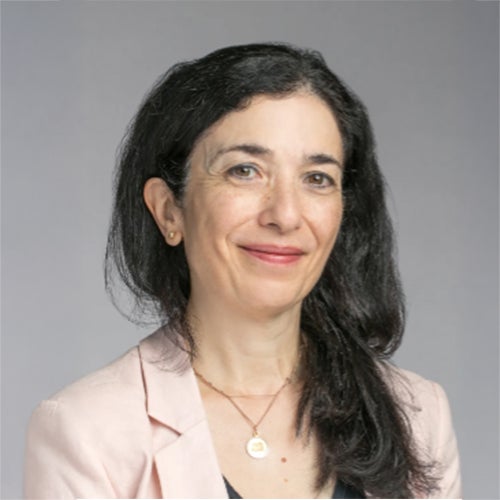
I am Professor of Medicine in the Section of Nephrology at Yale School of Medicine. I am a clinician, population health researcher, and clinical trialist. For years I served as a nephrology consultant to the Montefiore Care Management Organization and was the clinical lead for the Kidney Care Choices Model. I was also Medical Director of the Inpatient, In-Center and Home dialysis facilities affiliated with Montefiore. Currently I am Clinical Program Director for Centers for Outcomes and Research Evaluation at Yale New Haven Hospital.
Dr. Michelle Osuna-Diaz
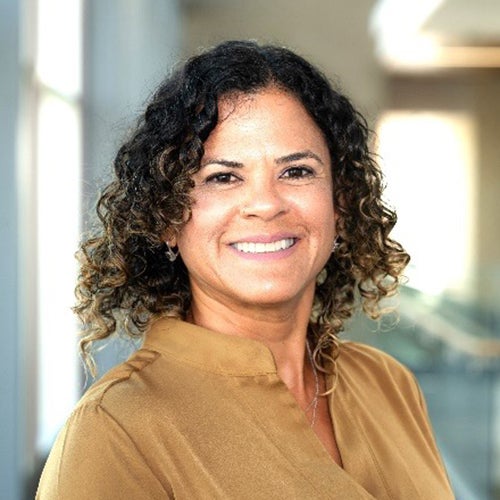
Dr. Michelle Osuna-Diaz is a licensed psychologist who holds a Doctorate in Psychology and a rich academic and professional background. She graduated from the University of Puerto Rico, Río Piedras campus, with a Bachelor's degree in Criminal Justice, specializing in Forensic Psychology, and a minor in Law and Society. Dr. Osuna-Diaz furthered her academic journey with a Master’s in Social Community Psychology, as well as a post-graduate certification in Non-Profit Business Administration.
Dr. Osuna-Diaz has worked in various roles within academic and non-profit sectors, including as a research assistant, research coordinator, program coordinator, supervisor, program evaluator, and director. She also taught math, science, and history for five years at two charter schools in Austin, Texas, demonstrating her commitment to education at multiple levels.
Currently, Dr. Osuna-Diaz serves as a Senior Research Program Coordinator and Assistant Professor at the University of Texas at Austin in the Dell Medical School, Internal Medicine Department. In this role, she is deeply involved in bridging the gap between academic research and community engagement. Dr. Osuna-Diaz is co-developing an intervention aimed at alleviating the burden of social needs among dialysis patients and high-risk populations prone to chronic kidney disease. She also co-chairs the only Kidney Community Advisory Board at UT Dell Med School, a testament to her leadership in this field.
Dr. Osuna-Diaz is dedicated to understanding and influencing psychosocial contexts and processes related to the quality of life in economically and socially disadvantaged communities. Her work focuses on equipping these communities with the tools and resources needed to exercise their rights in conditions of justice and equity. Through participatory community research, especially with underserved Hispanic populations and their descendants, she strives to close the gaps in health and education disparities, promoting improved well-being and equity for all.
Dr. Katherine Rizzolo
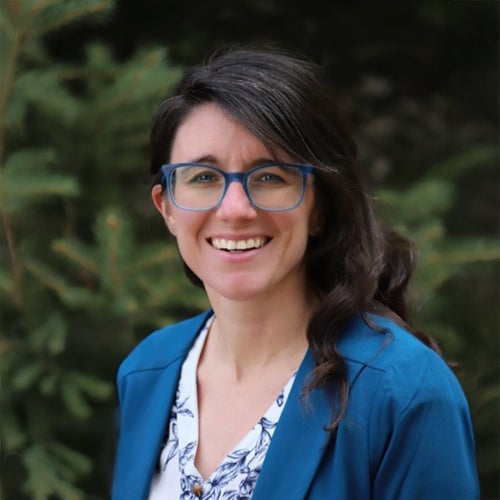
Dr. Katherine “Katie” Rizzolo is a clinical nephrologist and Assistant Professor in the Section of Nephrology at Boston Medical Center and a second-year fellow in the Evans Center for Implementation and Improvement Sciences at Boston University. Her research interests center on advocacy for underserved communities disproportionately by kidney disease, especially Latinx and immigrant populations. Her current research aims to improve access to kidney care for Latinx populations with kidney failure through community-based interventions.
Elanderia Rowe
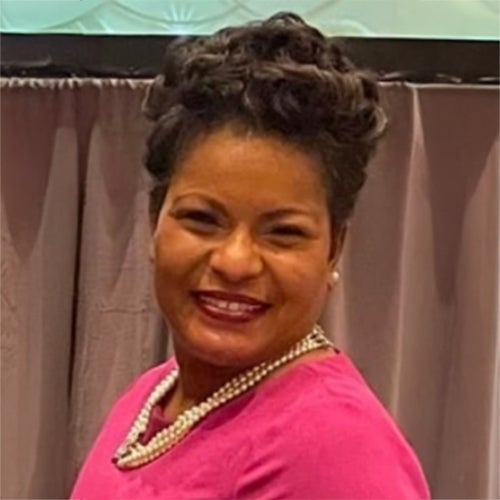
Elanderia earned a Bachelor’s in Social Work from a Prairie View A&M University, a Historically Black College/University and a Master’s Degree in Social Work from the University of Houston. Her love for the medical field stems from an opportunity presented to complete an intern at Parkland Memorial Hospital, Dallas ’County Hospital. Elanderia has worked in most medical Social Work fields including hospitals, Skilled Nursing Facilities, Hospice, Home Health, owned a Medical Case Management Agency and is currently in private practice as a Psychotherapist. She entered the field of Nephrology Social Work in Dallas’ Oak Cliff community in 2003 and has served as a Nephrology Social Worker with many marginalized patient populations over 20 years advocating for their voices to be heard and empowering them to self manage their healthcare needs. She is currently Davita’s Multi-Divisional Lead Social Worker for the all of Texas with the exception of Houston and East Texas.
Giving back to and building up the profession of Social Work, she has been and is currently a field Instructor for MSW Student throughout Texas and now even online programs for over 15 years. Nationally, she has volunteered her time on NKF’s Spring Clinical Meeting Executive Programs Committee for 4 terms and has presented at NKF SCM numerous times over the decade.
Elanderia earned the NKF Merit Award in 2017 and was inducted into the Fellowship of National Kidney Foundation (FNKF) in 2019. In her local and community, she is recognized by healthcare professionals for her advocacy for dialysis/transplant patients, commitment to advancing Health Equity.
In addition to a Bachelors and Masters degree in Social Work, she also holds a certification from University of Mass Medical School in Primary Care Behavioral Health Integration, earned a Lean Six Sigma Yellow Belt from Texas Health Resources and is a Certified Life Coach. In her spare time, she loves trail riding/bonfires and family gathers in the piney woods of North East Texas where she calls home, long naps, mentoring Social Workers new to the profession, reading and laughing out loud!!
Dr. Nagaraju Sarabu
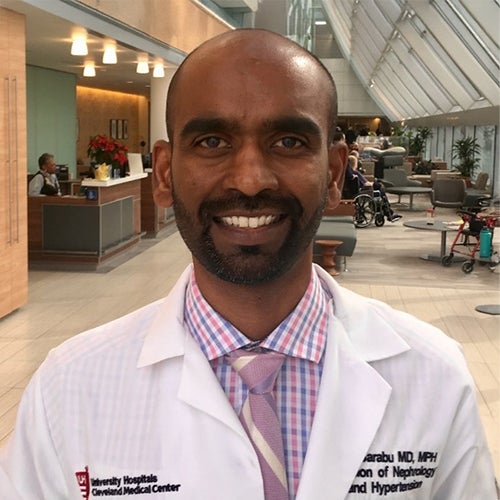
Dr. Nagaraju (Raj) Sarabu is a board-certified nephrologist at MetroHealth Medical Center in Cleveland and an Associate Professor of Medicine at Case Western Reserve University School of Medicine. He serves as Associate Program Director for the Internal Medicine Residency Program, where he mentors residents on quality improvement and clinical research. In addition to his busy inpatient and outpatient nephrology practice, Dr. Sarabu leads the MetroHealth kidney health quality and equity initiatives aimed at reducing health disparities in chronic kidney disease.
Dr. Sarabu earned his MBBS from Gandhi Medical College in India and completed an MPH at the University of Alabama at Birmingham. He subsequently pursued fellowship training in nephrology and transplant nephrology, and is currently completing a Master of Population Health at Thomas Jefferson University. A Fellow of the American College of Physicians, Dr. Sarabu has been recognized with multiple teaching awards. His academic interests include population health, mindfulness in medicine, communication skills, and expanding scholarship opportunities for trainees.
Dr. Sarabu is a dedicated advocate for reducing health disparities and expanding access to quality care. As an advisor to the National Kidney Foundation’s Health Equity Committee, he draws on his background in public health, medicine, and population health to guide initiatives that address the social determinants of kidney disease. With a passion for interdisciplinary collaboration, Dr. Sarabu partners with fellow committee members, medical professionals, and community leaders to develop and implement equitable strategies that improve patient outcomes. Through a commitment to inclusivity, innovation, and compassion, he remains steadfast in empowering communities and elevating kidney health nationwide.
Dr. Matthew R. Sinclair
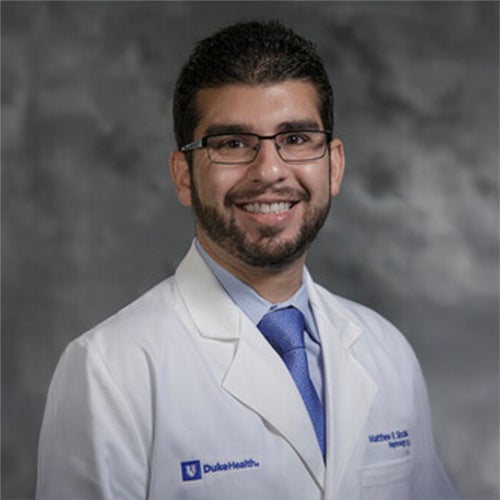
Dr. Matthew Sinclair is an Assistant Professor of Medicine in the Division of Nephrology, Department of Medicine, Duke University School of Medicine, a staff physician at the Durham VA Medical Center, and a faculty member at the Duke Clinical Research Institute. Dr. Sinclair attended medical school at Howard University College of Medicine in Washington, DC and then went on to complete an Internal Medicine residency and Chief Residency at the Zucker School of Medicine at Hofstra/Northwell in Manhasset, NY. In 2018, he began his Nephrology fellowship at Duke. While in training at Duke, Dr. Sinclair received formal training via the Clinical Research Training Program that led to him receiving a Master’s in Health Sciences Degree in Clinical Research. Following completion of his fellowship, Dr. Sinclair joined the faculty of the Division of Nephrology in 2021, where he works as a physician scientist. In his current role, he conducts research focused on reducing the progression of chronic kidney disease among racial and ethnic minorities, both by enhancing recognition of CKD risk factors among individuals in the community and developing interventions to optimize evidence-based care for vulnerable patient populations. When not at work, Dr. Sinclair enjoys traveling and spending time with his wife and two young sons.
Dr. Miriam Vélez-Bermúdez
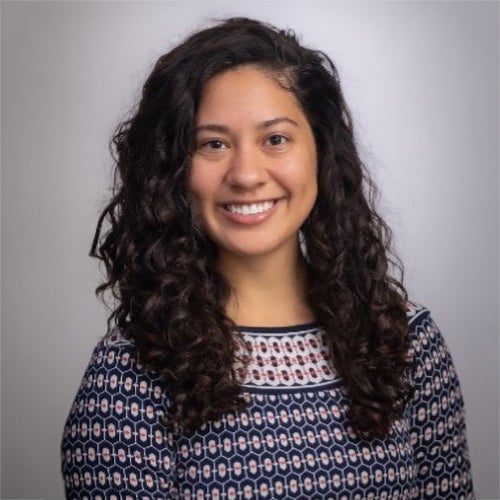
Dr. Vélez-Bermúdez is currently a postdoctoral fellow at University of New Mexico’s School of Medicine. She received her MS in Psychology from Arizona State University (2016), then went on to University of Iowa to obtain her MPH in Community & Behavioral Health (2020), Certificate in Biostatistics (2021), and PhD in Health Psychology (2022). Her research examines how psychosocial and sociocultural factors influence disease outcomes, and how structures and institutions impact patient and provider behaviors. She has a particular interest in Hispanic/Latine patients with chronic kidney disease (CKD). By applying multidisciplinary methods and engaging with community members and patients, she aims to create culturally-concordant interventions that improve CKD-related patient care.